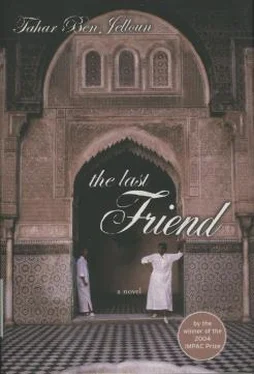Tahar ben Jelloun - The last friend
Здесь есть возможность читать онлайн «Tahar ben Jelloun - The last friend» весь текст электронной книги совершенно бесплатно (целиком полную версию без сокращений). В некоторых случаях можно слушать аудио, скачать через торрент в формате fb2 и присутствует краткое содержание. Год выпуска: 2006, Жанр: Современная проза, на английском языке. Описание произведения, (предисловие) а так же отзывы посетителей доступны на портале библиотеки ЛибКат.
- Название:The last friend
- Автор:
- Жанр:
- Год:2006
- ISBN:нет данных
- Рейтинг книги:5 / 5. Голосов: 1
-
Избранное:Добавить в избранное
- Отзывы:
-
Ваша оценка:
- 100
- 1
- 2
- 3
- 4
- 5
The last friend: краткое содержание, описание и аннотация
Предлагаем к чтению аннотацию, описание, краткое содержание или предисловие (зависит от того, что написал сам автор книги «The last friend»). Если вы не нашли необходимую информацию о книге — напишите в комментариях, мы постараемся отыскать её.
, Ben Jelloun presents a spellbinding coming-of-age story and a dazzling portrait of Morocco in an era of repression and disillusionment. In Tangiers in the late 1950s, two teenagers, Mamed and Ali, strike up an intense friendship that will last a lifetime. But lurking just beneath the surface is a deep, unspoken jealousy in danger of destroying them both.
The last friend — читать онлайн бесплатно полную книгу (весь текст) целиком
Ниже представлен текст книги, разбитый по страницам. Система сохранения места последней прочитанной страницы, позволяет с удобством читать онлайн бесплатно книгу «The last friend», без необходимости каждый раз заново искать на чём Вы остановились. Поставьте закладку, и сможете в любой момент перейти на страницу, на которой закончили чтение.
Интервал:
Закладка:
has brought out the dark side of your soul. You're listening to it as you plan this diabolical scheme. No, I refuse to believe you are capable of this."
The voice spoke to me and then was gone. I recalled scenes from the movie Ali liked so much. I remembered when the woman let her young handicapped brother-in-law drown in icy water because her husband spent too much time taking care of him. I remember the poison she gave her sister, before hiding the bottle in the sister's room, because she was jealous of her. I remember the way she wrapped her feet in a rug and deliberately fell down the stairs in order to lose the baby she was carrying. She was already jealous of the baby. I still remember how much this film disturbed me. But why was I thinking about this? I wasn't going to kill anyone. I was just ending a friendship that had lasted too long, in order to confront the pain of my illness alone. My reasons weren't clear. That's illness for you. Death itself is nothing. The real death is sickness, the long and painful sickness.
Another voice encouraged me. We are all contradictory, ambivalent, irrational. I coughed, I was tired, and I wanted to cry. When she came home, Ghita had red eyes. She must have been crying. The children were sleeping. I kissed them without waking them up. I refused to let myself break down. I had to keep up my morale. The next morning I had my first chemotherapy session.
i no longer responded to Ali's letters. When he called, Ghita told him I was on a mission in Africa or Asia. His last letters expressed alarm. He didn't understand what was going on, but he thought that something had happened and wanted to understand. I maintained my silence. When he told my wife that he was very worried, that he was getting ready to come see me because he suspected serious illness (I think he meant depression), I took the phone and spoke to him, my tone cold and dry. "No," I told him, "there's no point in you coming here. I'm coming to Tangier. I just have to finish some business here, and then I'll come. You prepare the bills, and we'll settle our accounts." I hung up without allowing him to respond. I was playing my role. I felt strong. It was curious, the extent to which provoking this dispute with Ali was boosting my energy. I didn't make any effort to speak to him. It was as if he had become an enemy.
My wife didn't understand this cruel charade. I was incapable of explaining my deepest feelings to her, or the reasons for my behavior. She did not like conflict in relationships. I made up something, saying Ali had disappointed me. She believed this immediately, adding her own examples of his supposed hypocrisy, which troubled me and made me feel worse. "Yes, now you get it. Your friend takes advantage of you. He's a profiteer, like everybody else in whom you confided without ever asking yourself why they were interested in you. People are jealous and hypocritical. Ali's no exception. Like the man who sold you your car after rigging the odometer. Like the man at the ministry in Morocco who said he was your friend, and then reported on you to the authorities before you left for Sweden. You're surrounded by people who put obstacles in your path. You had to come to Sweden to realize that. Ali might be nice enough, but his wife isn't — she's jealous of you, me, our children. It's natural she'd be jealous, since she can't have children of her own. Forget them all. Concentrate on getting your health back."
I didn't have the strength to answer Ghita. I was trapped. "You're wrong," I wanted to say, "but you'll understand later. Please don't speak badly of others, especially not Ali. We have thirty years of friendship behind us. Please respect this, and let me work things out in my own way."
I began to have doubts. I had set a dangerous spiral of evil in motion. I needed to keep Ghita out of it. But how? How
could I convince her that this didn't concern her? I needed to turn her into a neutral bystander who would ignore my behavior toward Ali. Her hardness had always taken me aback. Beneath her angelic appearance was a woman of steel, without compassion or compromise. Where did it come from? Her childhood, most likely. She had lived with her mother in the Rif Mountains. Her father had gone to work in Germany, and he returned once every two years, in the summers. She was raised without joy or affection. But she always refused to seek help. She said she was not interested in changing her behavior or her temperament. Ghita never expressed doubts. She was always sure of herself. It was almost impossible to negotiate with her. Fortunately, she had her good points. Sincere and frank, she could not stand the social hypocrisy so widespread in Morocco. She was remarkably intelligent, and made sure our children were getting a good education. She was both soft and hard.
six months AFTER my first chemotherapy session, Dr. Lov-gren became more optimistic, saying I could travel. He said I could go to Morocco on vacation, but I had to be careful, I could never touch anodier cigarette, and I should not even sit next to a smoker, or in a smoky room. That was going to be difficult in a country where everybody smoked.
Whether it was an opinion I had formed before seeing it, a self-fulfilling prophecy, or bad faith, I did not like the way Ali had furnished the apartment. That was a good enough pretext for a dispute. I waited for the right moment. As always, Ali was generous and helpful. He told me I had lost weight, that I looked different. I told him it was my work, the constant travel, and disappointment in married life. We had coffee together, and he confided in me, just like in the old days. He talked about his Spanish mistress, a nymphomaniac. "It's sex, it's all about sex, no feelings or emotions," he
said. "She's obsessed with sex." He added: "I don't feel guilty, since she's not a threat to my marriage, or to my emotional life."
I was suddenly jealous. I wanted something like this to tell him. In marrying Ghita, I had opted for marital fidelity, never looking at other women. It was a rational and comfortable decision. It tested my willpower. I loved Ghita. I could have had an affair with Dr. Lovgren's assistant. Briggit was available, and she made it clear to me in various ways, but I resisted. I had an impulse to tell Ali that he stereotyped women as either sexually obsessed or hysterical, but that wasn't really true of him. I did not want to pursue this discussion. I needed to set the stage for our forthcoming conflict. I asked him what he thought of Mortal Sin. He was astounded. It was overdone, he said. The screenplay was good, and so was the acting, but it was extreme. This wasn't jealousy; this was pathological. I asked what he thought about substituting a friendship between two men for the relationship between husband and wife. He had no idea what I was getting at. "There's no room for jealousy in a friendship," he said. "Friendship is pure; it's not based on sexual or material interest." He added: "You know, since you moved to Sweden, your attitude has changed. Has there ever been jealousy between us? I don't think so. We're friends because we share certain values and interests. We help each other, we have faced ordeals together, we know we can count on each other, there are
no issues with women or money between us. What are you getting at, Mamed?"
I could have launched into the argument right then and there, but I was a coward. I looked at him with tears in my eyes. I wanted to cry for myself, my plight, the things I was setting in motion. I bowed my head to avoid showing my feelings. I backed out of the dinner he had prepared for us that night. I said it was fatigue and malaise. Ali offered to come and keep me company. I discouraged him, and promised we would see each other the next day.
Ghita told me again that Ali's wife was jealous. "I don't like the way she looks at our children. She can't stand the idea of not having any of her own, even if Nabil is so cute," she said. "You don't think so? You think I'm wrong? You should trust my intuition. This friend of yours, the one you're always putting on a pedestal…" I told her to stop. I would not allow her to judge thirty years of friendship. It was not her problem. She needed to show some respect.
Читать дальшеИнтервал:
Закладка:
Похожие книги на «The last friend»
Представляем Вашему вниманию похожие книги на «The last friend» списком для выбора. Мы отобрали схожую по названию и смыслу литературу в надежде предоставить читателям больше вариантов отыскать новые, интересные, ещё непрочитанные произведения.
Обсуждение, отзывы о книге «The last friend» и просто собственные мнения читателей. Оставьте ваши комментарии, напишите, что Вы думаете о произведении, его смысле или главных героях. Укажите что конкретно понравилось, а что нет, и почему Вы так считаете.












